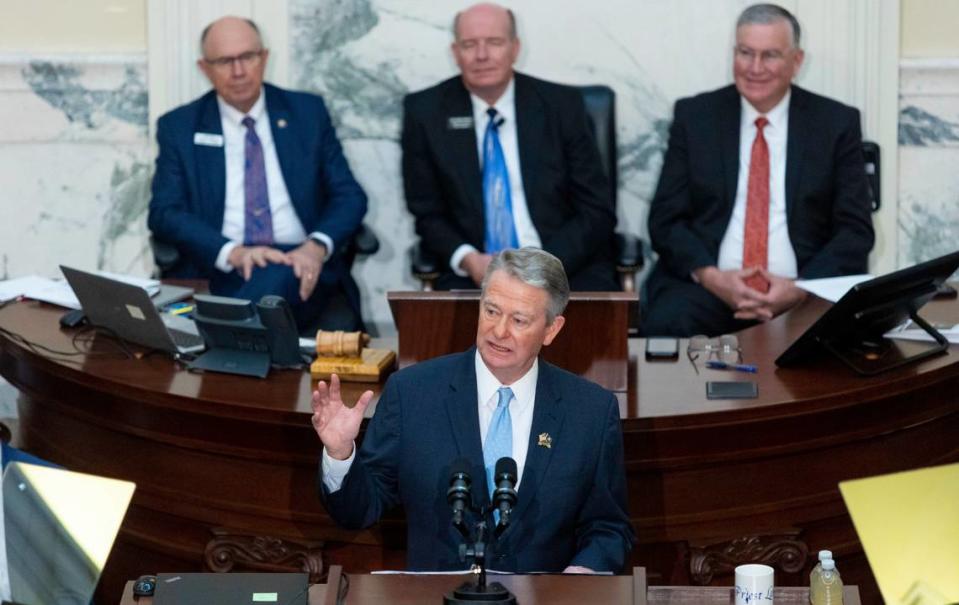Idaho Gov. Brad Little vetoes ‘hodgepodge’ property tax bill. Why he opposed it
- Oops!Something went wrong.Please try again later.
This is a breaking news story. Check back to idahostatesman.com for updates.
To sign up for breaking news alerts, click here.
The late discovery of a major flaw may have killed a sweeping property tax relief bill, which would direct hundreds of millions in state funds to residential homeowners.
Idaho Gov. Brad Little vetoed the bill Monday after a state official found the proposal would put the state’s bonding ability at risk.
House Bill 292 would leverage the state’s projected $1.4 billion surplus and sales tax revenue for at least $100 million in property tax credits, while directing another $100 million to school districts to pay off bonds and levies. Analysts found homeowners on average would see about 20% come off their property tax bill in the first year.
The bill also would make it more difficult for schools to pass bonds by eliminating one of four dates school districts could hold bond and levy elections every year. March election dates by far have had the most success for passing school bonds.
Little calls bill a ‘hodgepodge of policy items’
The Idaho Center for Fiscal Policy, a nonpartisan research group, found that the bill would result in 20% property tax relief in the first year. But the relief would vary widely, depending on where someone lives.
An Ada County home with a $300,000 assessed value would see about $500 reduced from a $2,000 property tax bill, the analysis found. The relief would be roughly the same in Canyon County, according to the analysis.
But in a veto letter, Little called the bill a “hodgepodge of policy items intermingled with property tax relief.” The Republican governor said the proposal jeopardizes “ready-to-go” transportation projects by re-ordering where sales tax revenues go.
Little also objected to removing the March bond election.
“A property tax relief bill this session needs to be simple and carried out in a way that does not harm public schools, does not hold up needed transportation projects, and does not reveal more unintended consequences,” Little said in a news release.
Layne McInelly, president of the Idaho Education Association, the statewide teacher union, said the group’s members “unequivocally support” the governor’s veto.
“By eliminating the March school election date, the most important on the calendar for the passing of school bonds and levies, this legislation risks destabilizing public school finances and puts children’s learning at risk,” McInelly said in an emailed statement.
‘Major flaw’ leads to veto
Last week, Gerald Hunter, president and executive director of the Idaho Housing and Finance Association, in a letter to Little wrote that the way House Bill 292 prioritizes sales tax fund sources would result in a lower credit rating from national rating agencies and a dip in the state’s borrowing capacity.
Senate President Pro Tem Chuck Winder, R-Boise, told the Idaho Statesman that lawmakers learned of the “major flaw” late last week.
“I don’t think people want to do an override when they understand that the consequences of that are devastating to the ability to issue bonds and have a good credit rating and get good interest rates,” Winder said. “That could end up impacting every taxing district in the state.”
To override a veto, the Legislature would need to vote on the bill again and secure support from two-thirds in each chamber.

After the governor’s veto Monday, the Senate quickly patched the property tax relief and school construction funding proposals onto a separate bill, House Bill 198.
Largely the same as the original proposal, the new bill does not include language related to transportation funding that raised concerns, and it excludes the bond and levy election date removal.
The Senate overwhelmingly passed the bill after a brief debate. The only opposition centered on the rushed process. Sen. Cindy Carlson, R-Riggins, said the Senate didn’t have enough time to read the bill.
“I feel like this is a disservice to the people that we represent,” Carlson said.
The new bill heads to the House, which recessed until Tuesday. House Speaker Mike Moyle, R-Star, who co-sponsored House Bill 292, told the Statesman that Republicans will discuss how they’ll move forward Tuesday.

